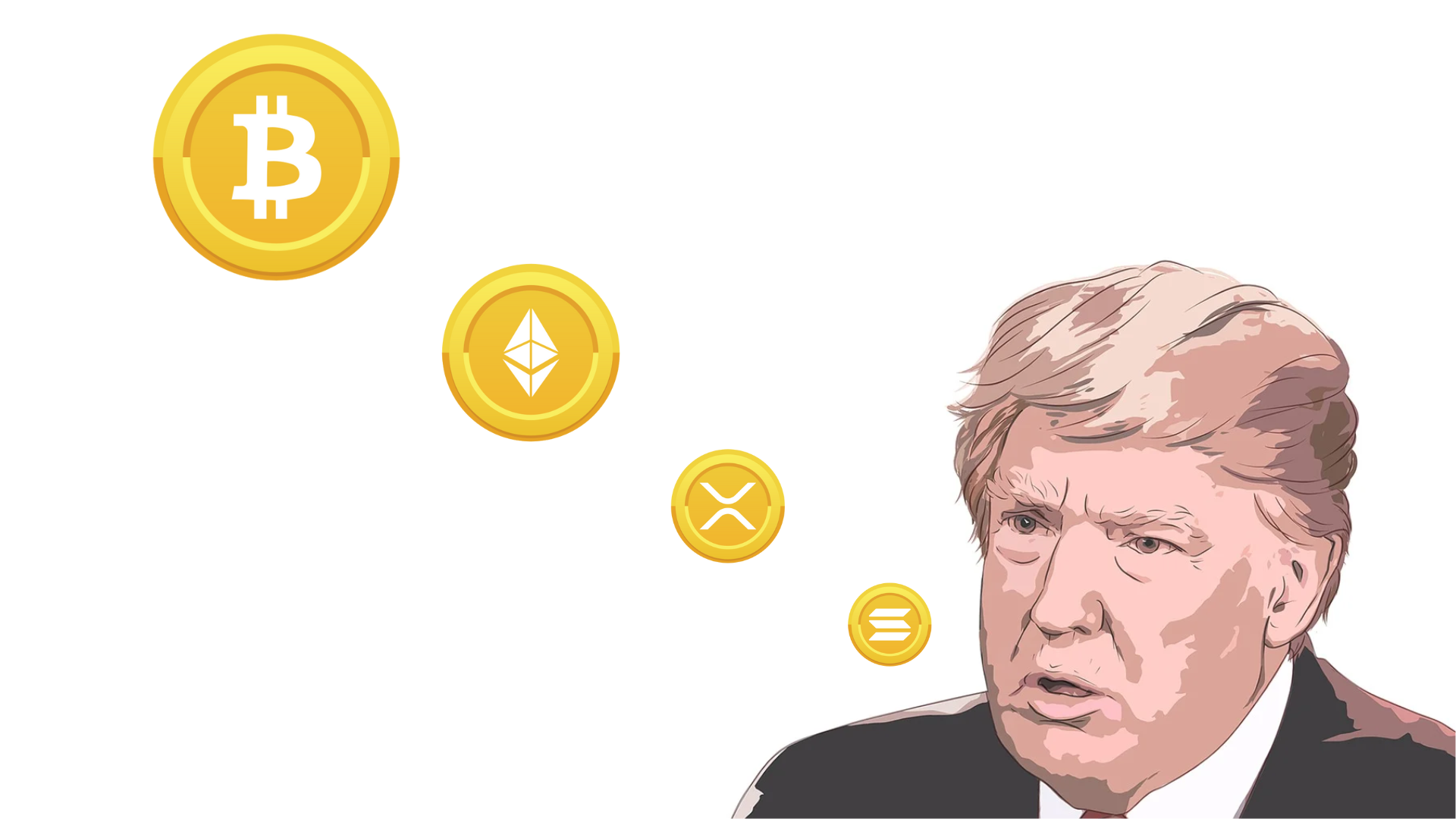From Promises to Policy: A Crypto Review of Trump’s First Four Months
Trump's first four months in office have brought major shifts to U.S. crypto policy, reshaping the industry at home and abroad.

Four months following President Trump’s second inauguration, the position of crypto in the United States and worldwide has evolved. Last year, the price of Bitcoin skyrocketed post-election, reaching unprecedented highs. It has since fluctuated, with a significant dip in April before climbing back up in May and reaching an all-time high of $111,100.
In our earlier article, we examined the promises Trump made during his campaign and how he began delivering on them during his first week in office.This second article of the series now turns to the following four months of his administration, exploring how his policies and actions have shaped the current crypto landscape and what lies ahead. Is America on its way to become “the crypto capital of the world”?
The Regulatory Landscape
Under Trump, the administration overhauled Biden’s restrictive stance on cryptocurrency to a more open, yet regulated framework. The winds of change were evident early on, but concrete policy updates through executive orders and shifts in regulatory bodies highlight this new direction the United States is taking in terms of crypto.
A major talking point during the electoral campaign for Trump was a strategic Bitcoin reserve—something he concretized early in his administration through an executive order creating a working group with the task of evaluating the idea of a national stockpile, as discussed in our February article.
Strategic Bitcoin Reserve and National Stockpile
On March 6, 2025, President Donald J. Trump officially established a Strategic Bitcoin Reserve and a U.S. Digital Asset Stockpile through executive order, following through on a major promise made at the Bitcoin 2024 conference.
The Strategic Bitcoin Reserve will be funded with bitcoin held by the Department of Treasury, obtained through civil and criminal asset forfeiture proceedings. These bitcoin holdings will not be sold. Additionally, the Secretaries of Treasury and Commerce are authorized to acquire more bitcoin through budget-neutral strategies that impose no cost on American taxpayers.
The U.S. Digital Asset Stockpile, by contrast, will consist of other digital assets—excluding bitcoin—also obtained through forfeiture. While the government will not purchase new assets for the stockpile, the Secretary of the Treasury may sell or manage these assets as part of a broader strategy for responsible stewardship, as outlined in the Executive Order.
The idea behind the strategic reserve is that it will benefit taxpayers and signal U.S. leadership in the world of digital finance. Some are concerned about the volatility of the asset, as strategic reserves traditionally store commodities with intrinsic value—raw materials or basic resources—in order to guard against supply shortages, including oil and gold.
Stablecoin Regulation
Progress towards stablecoin regulation does not only come from Republican Congressmen and Senators—through a bipartisan effort, the House of Representatives and the Senate respectively introduced the STABLE Act and the GENIUS Act. Despite failing to pass a key vote in early May, the GENIUS Act is set to move forward later in the month after further negotiations and an amendment was made to the bill
Both definitions characterize a payment stablecoin as a digital asset used for payments, value transfers or settling transactions. What distinguishes a stablecoin is that it is backed or supported by the issuer in one of two ways: either the issuer is legally obligated to redeem or repurchase the asset at a fixed monetary value (such as 1 USD), or the issuer commits to maintaining the asset’s value at a stable rate relative to a specific amount of fiat currency.
Both acts prohibit interests and yields to be paid to holders to prevent them from functioning like investment products—something many contest, including Coinbase CEO Brian Armstrong. They also provide that stablecoins will not be government-backed nor insured by the Federal Deposit Insurance Corporation (FDIC) or the National Credit Union Administration (NCUA). Both bills outline regulatory oversight and requirements for issuers (who must either have a federal or a state license). They also provide detailed custodial standards and bankruptcy protections.
There are key differences between the STABLE Act and the GENIUS Act that need to be resolved before they can become law. Chiefly, the bills differ in their treatment of foreign issuers, with the STABLE Act being open to foreign issuers as long as regulatory equivalence is recognized.
There are also contradictions in terms of transition from state to federal oversight, with the GENIUS Act requiring state-regulated issuers to transition to a federal regime if their stablecoin issuance surpasses $10 billion. On the other hand, in accordance with the STABLE Act, issuers could stay state-regulated indefinitely.
Furthermore, the GENIUS Act contains an explicit provision prohibiting “any member of Congress or senior executive branch official from issuing a payment stablecoin product during their time in public service”. While there is no such explicit provision in the STABLE Act, the issuing of stablecoins as outlined in the bill is reserved to permitted payment stablecoin issuers.
During negotiations this month of May, the GENIUS Act was amended in order to address Democrat concerns about the President’s relationship with cryptocurrency. The changes made include additional consumer protection safeguards and strengthened ethical standards that extend to special government employees including tech entrepreneurs like Elon Musk and David Sacks. Limits on tech companies issuing stablecoins were also added.
Tax and Reporting Changes
In April, Trump approved legislating repealing the IRS’ reporting rules for decentralized finance (DeFi) platforms, including KYC data and 1099 forms, making them exempt from reporting user transactions to the IRS. These changes are meant to facilitate innovation, which many consider to be stifled by compliance burdens.
Users of DeFi platforms remain responsible for reporting their gains and losses in compliance with IRS requirements. In addition, information reporting obligations continue to apply to centralized exchanges, digital asset payment processors and similar entities. Full enforcement—expected by 2027—will likely necessitate expanded KYC procedures, prompting many exchanges to begin preparing for these changes now.
Crypto Lawsuits
Years of conflict between crypto companies and regulators at the U.S. Securities and Exchange Commission (SEC) were brought to an end in late February, following the establishment in January of a crypto task force.
The SEC dropped its lawsuits and investigations against several crypto exchanges and trading platforms, including Coinbase, Ripple and Uniswap, signaling a shift toward a more conciliatory regulatory approach. SEC commissioner Hester Peirce describes a new era of the agency “where people [will] have great freedom to experiment and build interesting things, and which will not be a haven for fraudsters”.
Indeed, the Trump administration and Congress are signaling a new approach: encouraging innovation by rolling back onerous rules, while still insisting on tax compliance through more straightforward means.
Institutional Adoption and Sentiment
The shifting regulatory landscape—now increasingly favourable to cryptocurrency advocates—has significantly boosted market sentiment and accelerated institutional adoption. Since President Trump’s inauguration, major financial institutions, including Wall Street banks, asset managers and large corporations, have notably expanded their involvement in the crypto space.
Cryptocurrency’s prominent place in congressional debates and among regulatory agencies has brought greater legal clarity to institutions, particularly around key issues like asset custody. With the SEC now focusing on establishing compliance pathways rather than pursuing litigation against exchanges and trading platforms, many U.S. banks that had previously taken a cautious approach are now actively advancing their crypto service offerings, including Morgan Stanley. JPMorgan Chase, Bank of America, Citigroup and Wells Fargo are reported to be in talks to issue a joint stablecoin.
2025 is far from complete but it has been so far a monumental year for cryptocurrency institutional adoption. This itself is significant for customer sentiment and adoption. A rise in institutional adoption contributed to a 13% increase in the global market in 2024—and nearly half of the adults familiar with crypto believe Trump’s administration will further boost mainstream adoption during his second term.
The Trump Family Crypto Business
American Bitcoin, the bitcoin mining company co-founded by Eric Trump, is preparing to go public through a merger. Although Eric Trump has publicly distanced himself from his father’s administration during this term, the company’s trajectory still carries clear strategic and political overtones. Framing the move in historic terms, the co-founder drew a parallel to Cold War-era competition: “We won the space race. We better win the crypto race.”
This marks the latest in a series of crypto ventures the Trump family has undertaken over the past year. One such venture, the $TRUMP memecoin, initially surged to a high of $75.35 before experiencing a sharp decline in value since January. However, a recent announcement—that the coin’s top holders would be invited to a private dinner with the president—sparked a 58% price increase last month. Still, over 760K wallets lost money on the memecoin, while earning some early whales and the President robust sums.
Another Trump-affiliated venture is World Liberty Financial (WLF), where President Donald Trump serves as the “Chief Crypto Advocate.” The company recently launched a lucrative NFT collection featuring the President’s likeness, which he promoted by hinting at exclusive incentives—similar to the $TRUMP memecoin—including the chance to win prizes such as a private dinner. WLF has also pursued partnerships with foreign entities, including Pakistan’s Crypto Council, signaling its ambition to extend its crypto influence beyond U.S. borders.
Concerns
These business ventures are raising concerns about potential conflicts of interest. President Trump, whose family stands to profit significantly from the growth of the crypto sector, is actively facilitating its expansion through both policy and political influence. As part of his administration’s agenda, he has appointed crypto-friendly officials, championed pro-stablecoin legislation, and pursued deregulation aimed at fostering innovation—all while the Trump family deepens its commercial involvement in digital assets.
To that effect, the Senate is looking to pass a bill to “End Crypto Corruption”. This bill, if made law, would prohibit elected officials, senior executive branch personnel and their families from issuing, endorsing or sponsoring crypto assets and therefore, from benefitting from crypto. Trump’s supporters, on the other hand, argue that his crypto ventures democratize access to politics and energize innovation through real-world economic activity.
On the other hand, foreign investments in the Trumps’ businesses raise questions about the line between the political and the private, sparking fears for many about foreign influence on American politics. While federal law prohibits foreign entities from funding a political campaign, investors outside the United States see in the $TRUMP memecoin auction an opportunity to establish contact with the President. For instance, head of a Mexico-based transportation and logistics company Javier Selgas planned on buying millions worth of $TRUMP memecoins to persuade Trump to lower tariffs on Mexico.
Looking Ahead: International Impact
President Trump has made good on many of his promises to the crypto community, underscoring his determination to position the United States as “the crypto capital of the world.” His administration’s pro-crypto agenda has undeniably energized the industry, shifting the regulatory tone from skepticism to active promotion.
Yet, the motivations driving these initiatives remain murky. The increasing entanglement between public policy and private profit has raised serious concerns about conflicts of interest and the potential for foreign influence. As the U.S. expands its reach in the digital asset space, the need for transparency and accountability becomes all the more urgent.
At the same time, Trump’s crypto agenda is reverberating far beyond U.S. borders. His administration’s aggressive embrace of digital assets has prompted many countries to reassess their own strategies in response to America’s growing influence. For example, Pakistan’s newly formed Crypto Council illustrates how emerging markets are seeking to align themselves with this new U.S.-led crypto order.
In contrast, other nations are pursuing distinct—and sometimes competing—models. The United Kingdom, for instance, is working closely with the United States to establish itself as “a world leader in digital assets”. Meanwhile, China continues to maintain a strict ban on decentralized crypto assets, but it is advancing its state-controlled central bank digital currency (CBDC), positioning the Digital Yuan as an alternative that rejects the decentralized ethos underpinning U.S. leadership.
While the full consequences of America’s crypto pivot are still unfolding, early indications suggest the U.S. is reasserting itself on the global digital finance stage—not as a hesitant observer, but as a strategic frontrunner. Whether this leadership is sustainable depends not just on innovation, but also on credibility, transparency and ethical governance at home.
Sign up to our newsletter for more articles and insights.
Frequently Asked Questions
What Are the Strategic Bitcoin Reserve and the National Digital Asset Stockpile?
The Strategic Bitcoin Reserve as outlined in Trump’s March 6, 2025 executive order will be funded by the Department of Treasury’s bitcoin holdings. The National Digital Stockpile will be funded by digital assets other than bitcoins, and both reserves will be constituted of digital assets obtained by the government through civil or criminal forfeiture proceedings.
How Has Trump’s Administration Affected Overall Customer Sentiment Towards Cryptocurrency?
Trump’s administration has shifted the regulatory landscape favourably towards crypto, driving institutional adoption up. In turn, this is expected to increase customer confidence in cryptocurrency, and in Bitcoin particularly, and ultimately, increase adoption.
What Are Concerns About Trump’s Presidency Relating to Crypto?
Many express concerns about the question of conflict of interests that may arise regarding the Trump’s family’s crypto ventures, including American Bitcoin, World Financial Liberty and the $TRUMP memecoin, as well as foreign influence.









